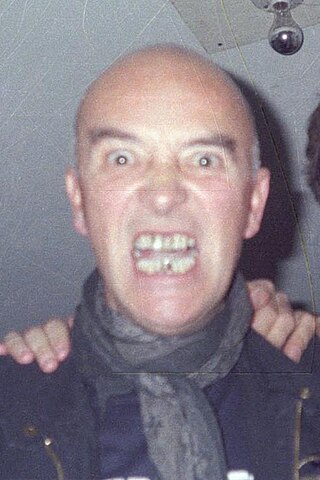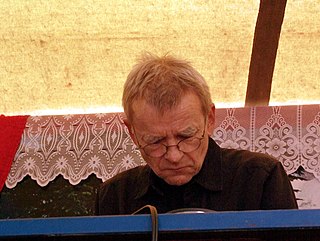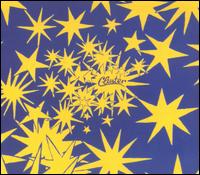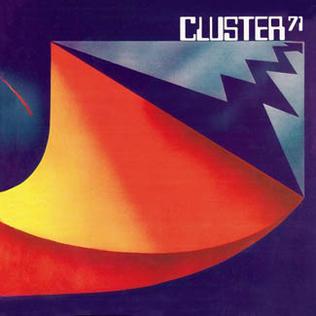
Neu! were a West German krautrock band formed in Düsseldorf in 1971 by Klaus Dinger and Michael Rother following their departure from Kraftwerk. The group's albums were produced by Conny Plank, who has been regarded as the group's "hidden member". They released three albums in their initial incarnation—Neu! (1972), Neu! 2 (1973), and Neu! 75 (1975)—before disbanding in 1975. They briefly reunited in the mid-1980s.

Odds & Sods is an album of studio outtakes by British rock band the Who. It was released by Track Records in the UK and Track/MCA in the US in October 1974. Ten of the recordings on the original eleven-song album were previously unreleased. The album reached No. 10 on the UK charts and No. 15 in the US.

Cluster were a German musical duo consisting of Hans-Joachim Roedelius and Dieter Moebius, formed in 1971 and associated with West Germany's krautrock and kosmische music scenes. Born from the earlier Berlin-based group Kluster, they relocated in 1971 into the countryside village of Forst, Lower Saxony, where they built a studio and collaborated with musicians such as Conny Plank, Brian Eno, and Michael Rother; with the latter, they formed the influential side-project Harmonia. After first disbanding in 1981, Cluster reunited several times: from 1989 to 1997, and from 2007 to 2010.

Conrad "Conny" Schnitzler was a prolific German experimental musician associated with West Germany's 1970s krautrock movement. A co-founder of West Berlin's Zodiak Free Arts Lab, he was an early member of Tangerine Dream (1969–1970) and a founder of the band Kluster. He left Kluster in 1971, first working with his group Eruption and then focusing on solo works. Schnitzler participated in several collaborations with other electronic musicians.

Dieter Moebius was a Swiss-born German electronic musician and composer, best known as a member of the influential krautrock bands Cluster and Harmonia.

To the Quiet Men from a Tiny Girl is the second album by Nurse With Wound and the last to be made by the founding trio of Steven Stapleton, John Fothergill, and Heman Pathak. The album also features contributions from French avant-garde musician Jacques Berrocal. It was recorded by The Bombay Ducks, an alias for Nicky Rogers and Vic Ball, the former of whom had facilitated the recording of the group's first album, Chance Meeting on a Dissecting Table of a Sewing Machine and an Umbrella. The album's title comes from Tolerance's album Anonymlink
Kluster was a Berlin-based German experimental musical group formed in 1969 by Hans-Joachim Roedelius, Conrad Schnitzler, and Dieter Moebius. Their improvisational work presaged later industrial music. The original Kluster was short-lived, existing only from 1969 until mid-1971 when Conrad Schnitzler left and the remaining two members renamed themselves Cluster. Schnitzler later revived the band from 1971 to 1973 and then from 2007 until his death in 2011.

Großes Wasser is the seventh album by the electronic music outfit Cluster. It was co-produced by former Tangerine Dream member Peter Baumann. Großes Wasser marked the return to Cluster working as a duo of Hans-Joachim Roedelius and Dieter Moebius after two albums collaborating with Brian Eno.

Hans-Joachim Roedelius is a German electronic musician and composer, known as a co-founder of the influential 'kosmische' groups Cluster and Harmonia. He is notable for his prolific discography either as himself, as part of a band, or in collaboration with other artists. He has more than 100 releases with his name. He also performed in the ambient jazz trio Aquarello, and released several solo studio albums.

Pebbles is a compilation of US underground and garage single record releases from the mid- to late-1960s. It had a limited original release in 1978 and a more general release in 1979. It was followed by several subsequent Pebbles compilations and albums. This album is nowadays known as Pebbles, Volume 1 and was originally issued in 1978 as Pebbles, Volume One: Artyfacts from the First Punk Era, an obvious riff on Nuggets: Original Artyfacts from the First Psychedelic Era, a similar, groundbreaking compilation from 1972.

Cluster II is the second full-length album by German electronic music act Cluster, released in 1972 by record label Brain.

Klopfzeichen is the debut full-length album by German experimental music trio Kluster.

Eruption is the third and final full-length album by German experimental music trio Kluster. It is also the only live recording issued by Kluster.

Cluster is the debut studio album by German electronic music outfit Cluster. It was recorded in 1971 and released the same year by record label Philips. It is also the only album on which producer Conny Plank is credited as a member.

Live in Vienna, 1980 is a live collaborative album by German electronic music outfit Cluster and percussionist Joshi Farnbauer. It is the first of four live albums recorded by Cluster, and their only work with Farnbauer.
Eruption was a short-lived German krautrock or experimental music super group founded by former Tangerine Dream member and then current Kluster member Conrad Schnitzler.

Musik von Harmonia is the debut album from the influential German krautrock group Harmonia, released in January 1974 by Brain Records. Formed by the addition of Neu! guitarist Michael Rother to Cluster, they recorded the album from June to November 1973 in Cluster's Forst recording studio. It was self-produced by the group using a primitive mixer and three tape recorders.

Deluxe is the second album from the West German krautrock group Harmonia, consisting of Neu! guitarist Michael Rother and the Cluster duo of Hans-Joachim Roedelius and Dieter Moebius. It was recorded in June 1975 in Harmonia's studio in Forst, Germany. It was first released on the Brain Records label in 1975.
Moebius & Plank was a German electronic music duo consisting of musicians Dieter Moebius and Conny Plank. They recorded three albums between 1979 and 1986 as well as two additional albums, one a collaboration with Mani Neumeier and the other with Mayo Thompson. Plank died of cancer in 1987. Their final two albums were released posthumously in 1995 and 1998 respectively
Bureau B is an independent record label, music publisher and booking agency from Hamburg, Germany, founded in 2005 by Gunther Buskies as a sister label to Tapete Records. The label releases varieties of electronic, free-spirited music, with the spectrum ranging from pop to avant-garde. The label has amassed an extensive catalogue of reissues and new productions, including classics from the genre of electronic music in the 1970s and early 1980s popularly classified as Krautrock, alongside new recordings by such formative artists as Faust, Kreidler, Roedelius, Tietchens, Moebius.
















